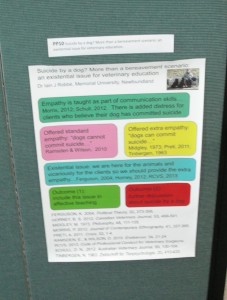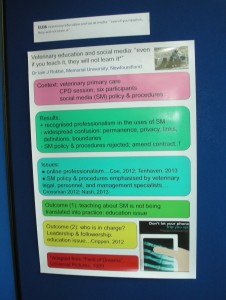 The work with educators in veterinary medicine continues to be stimulating and productive. It is not without its controversies involving issues of morality and ethics, philosophy, and empathy, even political theory. For example, two posters at the annual Veterinary Education Symposium led to some lively debates. The topics were:
The work with educators in veterinary medicine continues to be stimulating and productive. It is not without its controversies involving issues of morality and ethics, philosophy, and empathy, even political theory. For example, two posters at the annual Veterinary Education Symposium led to some lively debates. The topics were:
1) Suicide by a dog? More than a bereavement scenario: an existential issue for veterinary education.
2) Veterinary education and social media: “even if you teach it, they will not learn it”.
 Less controversially, my collaboration with all seven UK vet schools led to this publication:
Less controversially, my collaboration with all seven UK vet schools led to this publication:
Mossop, L., Gray, C., Blaxter, A., Gardiner, A., MacEachern, K., Watson, P., Whittlestone, K., & Robbé, I.J. (2015) Communication skills training: what the vet schools are doing. Veterinary Record, 176: 114–117.
We have come a long way since I facilitated a workshop on curriculum development in communication skills with representatives from the UK vet schools in 2009. There are significant synergies between medical education for veterinary medicine and human medicine and our collaborations are strongly in both directions.
Through a separate collaboration another paper has been accepted:
McDermott, M., Tischler, V., Cobb, M., Dean, R., & Robbé, I.J. (2015) Veterinarian-client communication skills: current state, relevance, and opportunities for improvement. Journal of Veterinary Medical Education, in press.
It is a good example of the productivity from a multiprofessional alliance involving the fields of veterinary research and education, psychology, arts and humanities, and community health.
